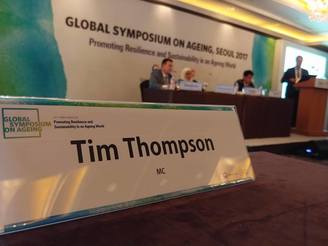
On Monday and Tuesday I served as the MC for the Global Symposium on Ageing in Seoul, an event that was co-organized by Statistics Korea (KOSTAT) and the United Nations Population Fund. My oldest client works closely with KOSTAT and arranged for me to serve as the conference MC. This was a meaningful opportunity for several reasons.
First, I got to audition as an MC for an event planning company that might use me again. I enjoy hosting conferences and this is the second government organization that has asked me to MC their events. Hopefully more opportunities like this will present themselves in the future.
Second, I was able to introduce myself to several new potential editing clients. Serving as MC means everyone in attendance sees you when you make an announcement so when you approach someone to say hello during a coffee break they are more receptive than if you were to approach them as a total stranger. They naturally ask about your day job and quite a few said they would contact me about editing.
Finally, I sat at the same table with the director of international relations for a government organization at dinner and one of my clients who was sitting with us introduced me to the director and talked me up big time. The person in that role is definitely the person you want to meet for future work opportunities in editing, training, and hosting international events.
When an interesting opportunity comes your way I hope you not only take advantage of it in the short term but also use it to create long-term opportunities for yourself as well. Hopefully, I will be able to share some of the dividends that came from this event in a future post.

 RSS Feed
RSS Feed